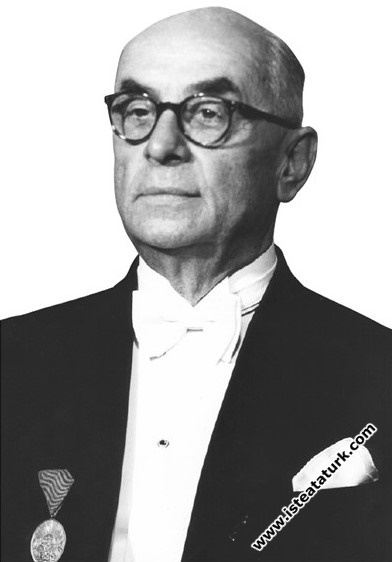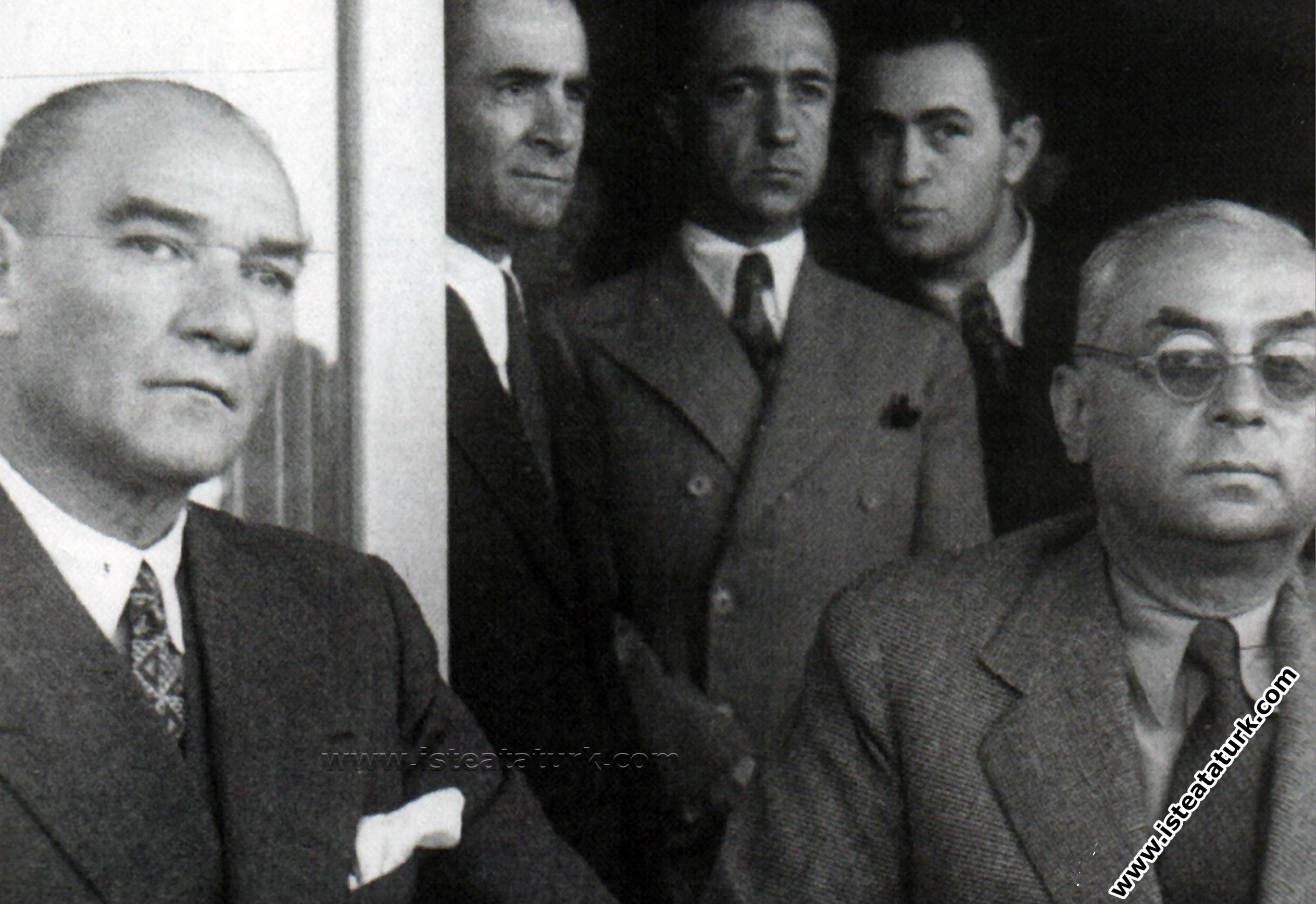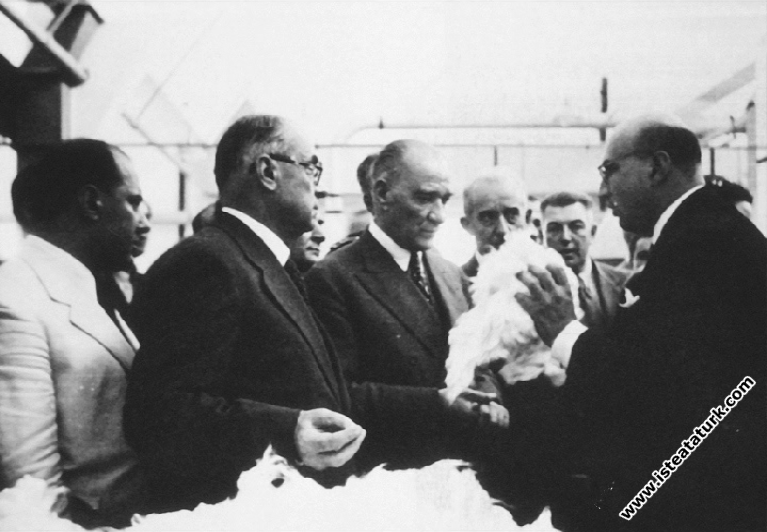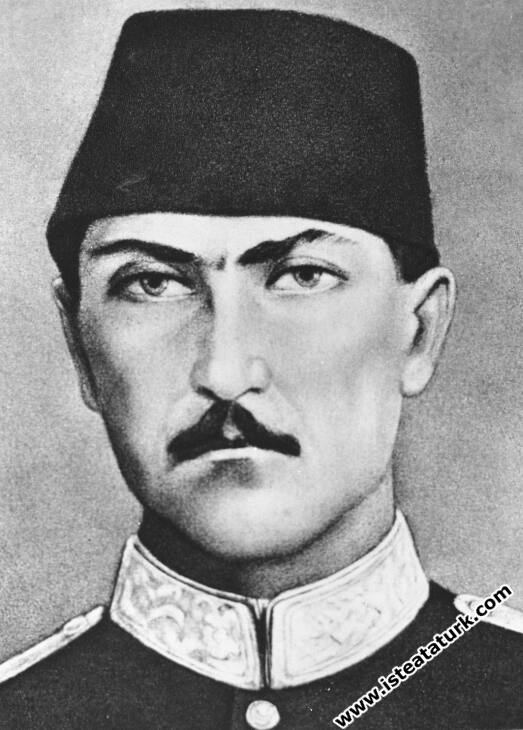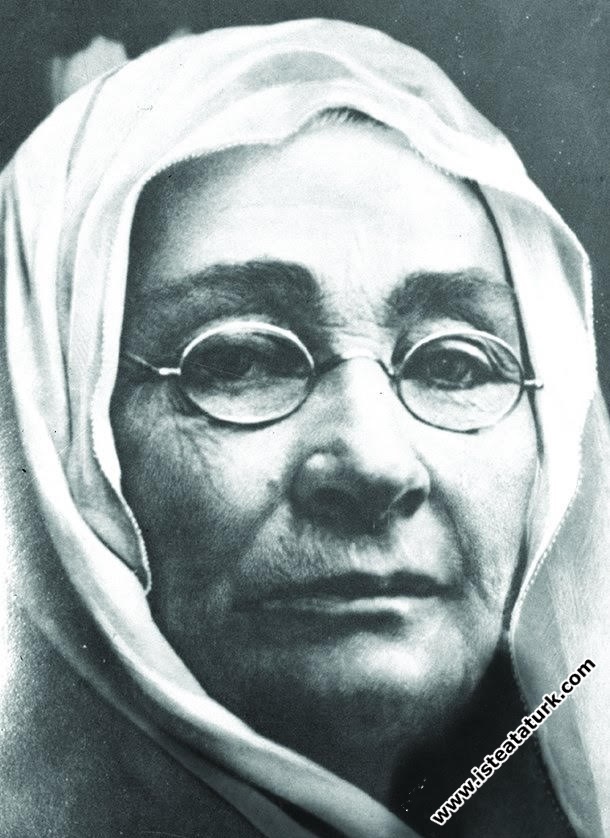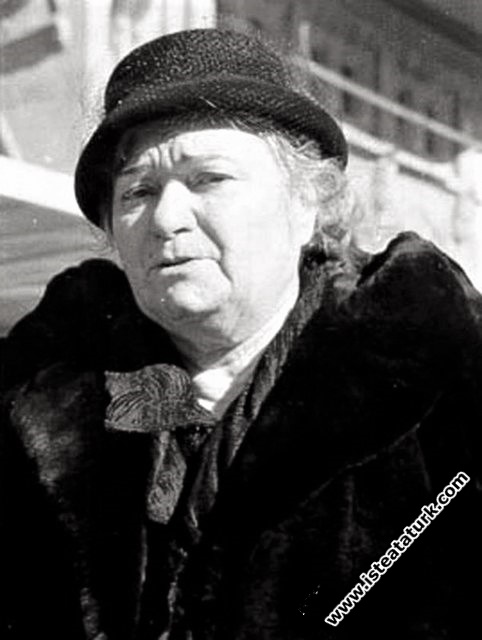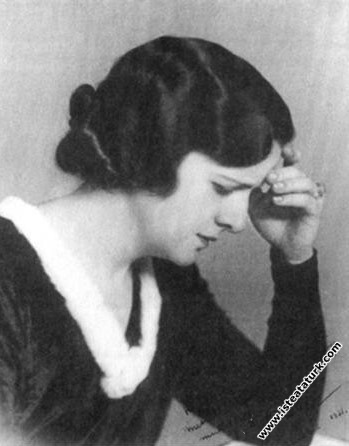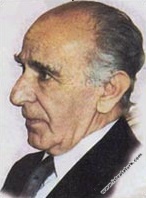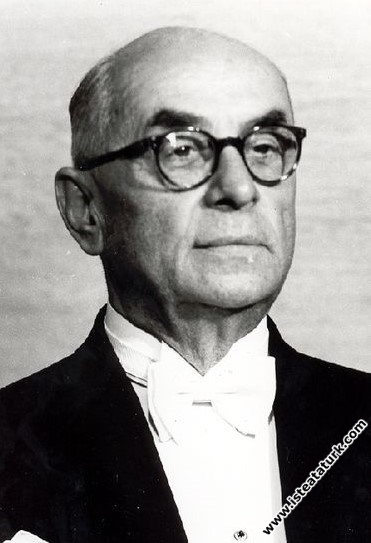
Celal Bayar
Character Size
Life of Celal Bayar
CELAL BAYAR
The greatest respect and admiration example of Celal Bayar's life of struggle – which that generation regarded as an uninterrupted struggle process – is that he did not lose an iota of his fortitude even when he was tried and sentenced to death in Yassıada as a result of the May 27, 1960 intervention. was able to stand upright like a sculpture carved from granite.
Entrance
“Sirs... The disaster that threatens the country is so great that it is impossible to prevent this disaster by just writing and drawing and speaking through great meetings. Even if the Greeks do not actually occupy this place, it is certain that they will follow their policies in Macedonia, they will constantly pursue Turkish villages by forming gangs through the commissioners, and they will make many attempts to extinguish the Turkish presence. Frequent recurring events around İzmir also strengthen this possibility. It is absurd to expect the present government to improve the situation. It is materially impossible to strengthen the government. In that case, there is only one thing to do: While continuing the scientific defense, on the other hand, it is to prepare a national force based on its weapons. It is necessary to know well that
This speech by Celal Bayar in a session attended by 165 delegates from the Defense of the Law Society, representing 33 districts from Aydın, Manisa, Denizli, Muğla, Balıkesir and İzmir surroundings before the invasion of İzmir in the spring of 1915, indicated that he would establish himself as an important state in his life line. It is the first proof of the difficult struggle that will carry them to their duties, to the heights of the Republic declared after the war.
Celal Bayar's speech revived “the national feelings that have filled the souls for months but could not find the opportunity to spurt”. Returning to their hometowns after this session, the delegates told the "hard and bare truth" to those who sent them.1
This historic session in Izmir, announcing that the Aegean is Turkish and should remain Turkish; It was dissolved with the decision to send a delegation of five members to Paris and, if necessary, to engage in armed struggle.2
There are two interesting aspects of Atatürk's "last" Prime Minister becoming the 3rd President of Turkey after his victory in the 1950 elections, 12 years after Atatürk's death, this time as the leader of the opposition. Growing up in the Turkish War of Independence and the school of Atatürk; the other is his “special” devotion to Kemal Atatürk, the architect of the Modern Turkish Nation and the founder of the Republic. As a matter of fact, Celal Bayar is the "third" and "last" person to rise to the presidency, along with Atatürk and İnönü, from the leadership that led the Turkish War of Independence and declared the Republic.
The speech of Atatürk, as the “last” Prime Minister, on 16 November 1938, at the rostrum of the Turkish Grand National Assembly, bears the traces of the deep love for Atatürk that is difficult to define in Celal Bayar:
“Friends, it is the most difficult task to fit into a short session to talk about Atatürk's life and past. With your permission, I say, addressing his spirituality from this rostrum, which represents the will of his great nation, whom he loves and trusts very much:
"Ataturk,"
“Loving and honoring you is the national duty and honor of every Turkish patriot.”3
On May 9, 1950, five days before the elections of May 14, 1950, which paved the way for the presidency, Celal Bayar seems to emphasize his closeness and devotion to Atatürk while speaking as a citizen of the Republic in Bursa, the constituency:
“I was born in the Umurbey village of Gemlik. My father is Abdullah Fehmi Efendi, who is the teacher of the village of Rüştiye. Those who know him say that he is a good person committed to his profession.”
“Since the first day of the National Struggle, I have been on duty with the Great Ancestor, while there were revolutions that attracted the admiration of the world. This closeness and devotion, which constituted the greatest happiness of my life, continued until the moment when Atatürk surrendered his breath to Allah.”4
Throughout his life, Celal Bayar took care to emphasize his special bond with Atatürk and to explain the role of the Founding Leader in the formation of Modern Turkey.
The scenes in a memoir quoted later by a Democratic Party politician are just one example of this situation:
“In 1953, the Democratic Party Government was going to lay the foundation of some new facilities in Kütahya, especially the Nitrogen Factory. Heads of state and government, a large entourage were present at these ceremonies. Among the items on the agenda of that day was the opening of T. İş Bankası Kütahya Branch. It was deemed appropriate for me to make the opening speech of the bank on behalf of the board of directors. In my speech, I cited Bayar as 'the father and pioneer of our national banking'. After the ceremony, when we returned to the army house where we were guests, Bayar invited me to join him, we walked together to a secluded corner of the hall, and he said to me, 'It was nice of you to talk, but you made a big mistake.' When he saw me looking at his face with amazement, he continued his words as follows: Atatürk is the pioneer of every innovation in Turkey and as you say, his father is Atatürk, and he is the father of our National Banking. I only acted on his orders and directives, there is no other explanation for this,' he said. Upon this, he understood that I was very upset and consoled me by saying, 'Do not be sad, I wanted to warn you so that you do not make such a mistake again.'5
After the opposition led by Celal Bayar won the elections with a large majority on 14 May 1950, the Democrat Party Parliamentary Group met on Saturday, 20 May 1950, to determine the President and their candidates for the Council of the Assembly. Although there were tendencies to bring former Supreme Court President Halil Özyörük or retired Gen. Ali Fuat Cebesoy to the Presidency for a while, in line with the suggestions made from the party headquarters, the Group appointed the chairman of the party Celal Bayar to the Presidency, and Refik Koraltan, one of the four founders of the party, to the Presidency of the Assembly. has chosen as a candidate.6
Istanbul Deputy Celal Bayar, who won 387 out of 453 votes in the Presidential election held in the Turkish Grand National Assembly on May 22, 1950, was elected as the 3rd President of Turkey. The distribution of votes given to other persons in the election is as follows: İsmet İnönü 64 votes, Halil Özyörük 1 vote, hesitant 1 vote. After the election, Celal Bayar started his duty by drinking and drinking.7
When the new President entered the Assembly hall to take his oath, the Democrat Party deputies greeted him with applause in their seats. With this behavior, the Democrat Party members complied with the rule they established after the 1946 elections, and did not stand up when the president entered the general assembly hall, although he came with a free election. Deputies from the Republican People's Party greeted the new president standing, but without applause.8
TURNOVER AT ÇANKAYA MANSION
It is possible to trace Celal Bayar's first days at the Çankaya Mansion, in part, from the notes of Haldun Derin, Chief of Staff to former President İsmet İnönü:
“Bayar had General Clerk Cemal Yeşil invited to his house. We talked to Yeşil when he returned to Kalem from Bayar. Bayar wanted all his friends to continue their duties. 'Inonu is a historical figure. If there is an order, you follow it. You keep your contact. To think otherwise would be to act with an Oriental mentality. I kiss the eyes of Chief Aide Cevdet.”9
“On the morning of 23 May, at number 18, where we had said goodbye to İnönü two days ago, all the civil servants, especially the general clerk, gathered. Bayar came from the city and met us. 'Carefully continue your duty,' he said. For now, he will sleep alone in the Köşk. Emin, the trustworthy chambermaid he brought from his house, is with him...”
“We went to Atatürk's temporary tomb by cars from the parliament. A large crowd shouts, 'Live, Exist,'(...)”10
Presidential Chief of Staff Haldun Derin notes another important change observed in the Çankaya Mansion in the early days as follows:
“The announcement that the Mansion gardens and the old Mansion are open to the public on Saturdays and Sundays is a brilliant invention that has not come to mind for twenty-seven years.”11
In the meantime, there are new names joining the Mansion Private Secretary:
One of them, diplomat Fikret Belbez, who had the opportunity to work closely with the President for two hours almost every day, from February 1951 until he was appointed to the Warsaw Embassy in July 1951, conveys his observations as follows:
“I would present the cipher telegrams and reports sent from the Foreign Ministry to our President every day by combining them according to their subjects.”
“Mr. Bayar would read these telegrams carefully, underline the places they deem important, and ask questions if necessary. They would study and evaluate each telegram, collecting all their intellectual energy. They worked very calmly without speaking. In fact, they spoke little, rather they listened to the other person.”
“His writings are very clear, clear and simple. There are no complicated sentences, unnecessary adjectives, forced or embellished expressions in his style.(...)”
“The more one gets to know Mr. Bayar, the better he understands why Atatürk chose him from among so many of his friends and put him in charge.(...)”12
NEW YEAR CELEBRATION IN THE MANSION
President Celal Bayar was among the guests of the New Year's Eve celebration held in the Guard Regiment casino at the end of 1950. After this New Year's Day, President Bayar spent some holiday nights and New Year's greetings among officers, non-commissioned officers and their wives in the military casino, which consisted of a small hall in the Villa in those years.13
MEETING IN PRIVATE WAGON
“We were in the first year of the Democratic Party government. President Bayar was returning from Istanbul to Ankara in a private wagon connected to the Anadolu Express, of which I was among the passengers. There were other passengers who were deputies in Qatar. Shortly after the departure, we were invited to the private car by the President. Among the problems of the day, the ordinary rape cases against Atatürk statues occupied an important place. In fact, these attacks started a few years ago and could not be prevented by the outgoing government. The new government saw the need to take legal measures to protect the works and memories of the Great Savior and prepared a bill for this purpose. The government's decision was the subject of various comments and discussions in the press, in the backstage of the Turkish Grand National Assembly, especially among the members of the Democrat Party Group. As soon as the deputies summoned to the special car took their places, Bayar began to speak. He looked excited, trying to contain his anger. After a brief introduction, he went on to say with unmistakable certainty, with an excited tone and determination that he didn't need to hold back:"
"If the law, which I consider essential to prevent these serial rapes, is blocked or deviated from its purpose, it is not possible for me to continue as the President of the Republic, which cannot protect its founder. In this case, I cannot remain a member of the Turkish Grand National Assembly and your Party (ie the Democrat Party). "I will resign from the Presidency, the Parliamentary position and your Party. I will bring my cause before my nation and start the struggle there."
“The stage is still before my eyes with all its vitality, the resolute sound, with all its vibrations, is still in my ears. I always remember and live this noble manifestation of Atatürk's love with the same admiration.”14
ANITKABIR CONSTRUCTION AND FIRST CEREMONY
First Lieutenant (later General) Sabri twentybeşoğlu, one of the officers in the Presidential Guard Regiment in the early 1950s and the Commander of the Anıtkabir Guard Company, explains:
“With Bayar's personal interest, as the construction started to progress, we moved from Çankaya to Anıtkabir with our company. A separate building was not built for the division to stay in. By necessity, we placed the soldiers at the end of the Aslanlı road, the Mehmetçik Tower on the right, and the lower section where İnönü's tomb is now located, and the company and team commanders in the upper section, which is now the Museum Directorate. The walls were wet, especially the lower corridor, where we put the soldiers, was damp, water was leaking from the walls. In the winter, we installed large gas stoves because there was no heating system. Since the outlet level of the pipes from the ground was very low, the stoves did not draw some nights and the soot and gas were emitted outward, our faces became black with soot and soot. The place to wash the clothes of the privates, the washing machine and other necessary places were insufficient. We probably couldn't light a fire in a place like Anıtkabir and wash the clothes of the privates in the cauldron. Due to curiosity, many local and foreign people came to watch the progress of the construction.(...) Despite all the troubles; We were proud and honored as members of the Anıtkabir Guard Company. President Bayar would come to the Anıtkabir construction site every two or three days, if not every day, see what was done and compliment us and the other employees.”15
“Finally, on November 10 [1953], with a magnificent ceremony, the heart of Turkey was beating in Ankara, with excitement as if all Ankara residents were on the route, Atatürk's body was brought to Anıtkabir and he was buried in his grave prepared under the Mausoleum. We had her sisters, Makbule Hanım, and Aslanlı seated on a chair at the beginning of the road, wiping her tears, it was as sad as it was on November 10, when her brother passed away.”
“Former Chief of General Staff General Salih Omurtak, General Staff II. We had brought the President in his uniform with a vehicle from his house to the ceremony, he was hardly walking.(...)”
“Only the President, the Speaker of the Parliament, the Prime Minister and the previous President İsmet İnönü, the Speaker of the Parliament and the Prime Minister, the Presidential Guard Continental Commander and the Guard Company Officers were present at the burial of Atatürk under the mausoleum.”16
SPEECH OF PRESIDENT BAYAR
President Celal Bayar's speech at the burial ceremony of Atatürk's body in Anıtkabir is as follows:
“It was an unbearable pain for me to think that St. Atatürk was lying on a wooden table in the Ethnography museum. With constant monitoring, the Anıtkabir was finally completed three years later. Together with Prime Minister Menderes, we reviewed Anıtkabir for the last time; We have decided that we can entrust Atatürk to his eternal tomb on November 10, 1953.”
“If being President has a different value and pleasure than the honor it brings to a mortal, it is for me to have lived the historical day when I took Dear Atatürk from the Ethnography Museum and entrusted him to his eternal mistress in Anıtkabir.”
“We covered the distance from the Ethnography Museum to Anıtkabir in 4.5 hours. After I deposited the saint's corpse on the land of my homeland, I made a long speech that I could not hold back my tears. I said it to my heart, to my heart's content. And I finished my words like this:
"ATATURK! You were one of us!... There were those who wanted to make you a Caliph and a Sultan. You didn't compliment. You chose the path of national will! You dedicated your life and personality to the service of the nation! You are the Turkish nation with all your virtues!.. Now we give you to the holy lands sent from every corner of the homeland you liberated. Know that your true place is the grateful breast of the Turkish Nation, which you always believe in and attach to!... Rest in peace!..”17
“ATATÜRK IS REALISTIC”
“There is no place for 'emotion' in Atatürk's methodology. Just as a scientist who entered the laboratory does not distinguish between oxygen and hydrogen in the tube, and does not see one of them closer to himself, a statesman entering the laboratory of social science must get rid of all his emotions in order to reach the right conclusion. Atatürk was able to do just that… If you can do it, you will think like Atatürk.”
“Because of all I have said, I say that just as it is difficult to think like Atatürk in matters where our feelings are mixed, it is completely difficult to make others believe him after thinking like this and finding the truth. Atatürk overcame this double difficulty in 1918 and was able to get his "National Pledge" decision accepted by a tough congress like the Erzurum Congress. This first medicine of Atatürk's prescription was poison in the emotional conditions I described. And Atatürk was able to persuade the patient to drink this poisonous medicine.”
“It is a big, very big job!..”
“Especially Erzurum, Sivas Congresses and a large part of the First Grand National Assembly deputies were very close to emotional decisions. Even in the days when the victory was won and the Lausanne negotiations were carried on, we came across those who offered to 'walk and take Athens' when there was the slightest resistance from the other side!..”18
CELAL BAYAR AND REACTION
İhsan Sabri Çağlayangil, the governor of Bursa, the electoral district of President Celal Bayar, explains:
“Before the 1957 elections, a few ignorant bigots in Bursa had climbed to the pulpit of the Ulu Mosque with swords in their hands, saying, 'We are the Mahdi,' during a Friday prayer, and caused an uproar. A police officer, who came to prayer in civilian clothes that day because he was on leave, bravely confronted this madness, and with the help of the vigilant community, he immediately immobilized the bigots and brought them to the Governor's Office.”
“We had just started the investigation with my dear friend Turhan Kapanlı, the Bursa Prosecutor of that time, when President Bayar called me on the phone and in person:”
“I learned the case now,” he said. Neither the rapid suppression of the movement nor the incapacity of the perpetrators should be a reason to underestimate the event. The case has nothing to do with religion and religiosity. These are the traders and brokers of Islam. They cannot be alone. He must have mentors, supporters and promoters. You have to get to the point of the incident and expose the whole network quickly.”
“Remember Atatürk's sensitivity to reaction. What he would have done in the face of this event had he been alive, we must do them today. At your age, I expect you to act like this and reach the result quickly, and I ask you to.”19
NOVEMBER 10 CEREMONY IN PRISON
With the military intervention of 27 May 1960, President Celal Bayar and Prime Minister Adnan Menderes, Members of Parliament and Government from the Democrat Party were arrested and put in prison. At the end of the trials known as Yassıada Courts in Turkey's recent history, Prime Minister Adnan Menderes, Foreign Minister Fatin Rüştü Zorlu and Finance Minister Hasan Polatkan were executed. President Celal Bayar's death sentence was commuted to life imprisonment on the grounds of old age and they were imprisoned in Kayseri Prison together with other political prisoners (Democratic Party politicians and bureaucrats of the time).
The following lines are interesting in which a political prisoner, one of Celal Bayar's fateful friends, tells about the “Atatürk Commemoration Ceremony” they held in prison:
“The first time we spent in Kayseri Prison was at the beginning of November. Friends had asked Hikmet Bayur to give a speech on the anniversary of Atatürk's death. He said, 'This job is not for me when there is Bayar.'”
“Bayar was going to talk.”
“That day, we all gathered in the inner courtyard of the section of Kayseri Prison reserved for us. Bayar came to the courtyard with steep and serious steps. He was dressed neatly as usual. In his speech, he talked about what that great Turk did for his country; His voice started to tremble as he talked about how he cared about his own health to save Hatay even in his illness, and two drops of stone rolled from his eyes to his cheeks.”
“We were all emotional.”20
From Celal Bayar's diary:
“Today, at 9.05, I took a stand of honor for Atatürk with all the detainees.”
“I was offered to give a speech, I spoke.”21
CELAL BAYAR'S AFFILIATION AND İSMET İNÖNÜ
Experienced statesman İsmet İnönü was constantly interested in the situation of Celal Bayar and his friends, who were held in Kayseri Prison with a life sentence, and after the military intervention, after the transition to civilian rule was completed, he succeeded in solving the political amnesty problem despite great difficulties.
Regarding the pardon of Celal Bayar and his friends, İsmet İnönü told his wife Mevhibe Hanım:
“I want to end a painful cycle. Democracy is acquired through some experience. Sometimes they are painful. The conditions lead to this conclusion as much as the administrators.”22
104 YEARS OLD
The Victorious Hodja of the Turkish War of Independence, 3rd President Celal Bayar passed away at the age of 104. He was born in 1883 in Umurbey Village of Gemlik. He started his working life as a clerk at the Gemlik Court and Reji offices; then he worked at Bursa Ziraat Bank and meanwhile continued his education at Harir Darü't-talimi and College Français de l'Assomption. Celal Bayar's political life began when he took office in the branch of the Committee of Union and Progress, which was opened in Bursa after the Second Constitutional Monarchy. After a while, he was appointed as the General Secretary of the Bursa and then İzmir Union and Progress Branches.
He encouraged cooperatives and published the Journal Towards the People; He wrote articles under the pseudonym Turgut Alp. He joined the Defense-i Law-i Osmaniye Society in 1918. After the occupation of İzmir, he actually took part in the recapture of Aydın and became the Akhisar National Front Regiment Commander. He entered the Ottoman Parliament in 1920 as a Saruhan deputy. Due to a speech praising the National Struggle, he moved to Anatolia when a warrant of arrest was issued against him and became a deputy of Bursa in the I. Grand National Assembly of Turkey. He served as Minister of Economy in 1921 and temporarily as Minister of Foreign Affairs in 1922. He is the advisor of the first executive committee of the Lausanne Conference. After the 1923 elections, II. He is a deputy of İzmir in the Grand National Assembly. In 1924, he was commissioned by Atatürk to establish the Türkiye İş Bankası. He became Deputy Minister of Economics in 1932 and was appointed Prime Minister in 1937. He remained in this post until 25 January 1939.
On January 7, 1946, he founded the Democratic Party with his friends and was elected as its chairman. He was elected President on May 22, 1950, with the Democrat Party's majority in the Grand National Assembly of Turkey in the 1950 elections. He was dismissed from his duty with the military intervention of 27 May 1960 and was sentenced to death by the Yassıada Court. However, due to his old age, his sentence was commuted to life imprisonment. He was released on 7 November 1964 on health grounds.
Celal Bayar, who passed away on August 22, 1986, was married to Ms. Reşide Bayar and had three children.
The following is written in the Diary of President Kenan Evren, who received the news of the death of the 3rd President Celal Bayar:
“August 22, 1986:”
“They brought the news of the death of Celal Bayar, who has been in a coma in the hospital for two days. Prime Minister Özal was also present at the dinner. They wanted to know my directive on how to hold a ceremony. I said let's do the same thing that was done to the late Cevdet Sunay, so we decided. The deceased lived to the age of 104. Who will be blessed with such a long life?”23
“28 August 1986:”
“I went to the funeral of Bayar, who was removed today, on foot as far as the Maltepe Mosque. It was very crowded along the way. Bayar's daughter, Nilüfer Gürsoy, who is close to the end of the ceremony at Maltepe Mosque, came to me with her husband and daughter and expressed their satisfaction over and over again for this ceremony held for her father and thanked them.”24
Following the death of the 3rd President Celal Bayar -the day after his death-Journalist Oktay Ekşi's assessment was as follows:
“Bayar did not have a serious education. But he was well brought up. Likewise, he did not do his regular military service, but he took part in all the important struggles of his time. The services he rendered to his homeland as the 'Victory Hodja' of the Turkish War of Independence brought him a great reputation with the Red Cord Medal of Independence.”
“The most admirable example of Bayar's life of struggle - which that generation used to accept as an uninterrupted struggle - is that he did not lose an iota of his fortitude even when he was tried and sentenced to death in Yassıada as a result of the May 27, 1960 intervention. was that it could stand upright like a sculpture carved from granite.”25
1 Cemal Kutay, Celal Bayar, Bir Türk’ün Biyografisi, (İstanbul, Onan B., ?), ss. 53-54.
2 Erkan Şekerci, Türk Devrimi’nde Celal Bayar, 1918-1960, (İstanbul Üniversitesi Atatürk İlkeleri ve İnkılâp Tarihi Enstitüsü Doktora Tezi, 1999), s. 33.
3 Celal Bayar, Atatürk’ten Hatıralar, (İstanbul, Sel Y., 1955), s. 10.
4 Celal Bayar’ın 1946, 1950 ve 1954 Yılları Seçim Kampanyasındaki Söylev ve Demeçleri, (Ankara, Doğuş M., 1955), ss. 65-66.
5 Atıf Benderlioğlu, “Bayar’ın Atatürk Sevgisi,” 100. Yaşında Celal Bayar’a Armağan, (İstanbul, Tercüman Y., 1982), s. 41.
6 Rıfkı Salim Burçak, On Yılın Anıları (1950-1960), (Ankara, Nurol M., 1998), s. 50.
7 TBMM Tutanak Dergisi, Dönem IX, Birleşim 1, Oturum 1, (22 Mayıs 1950), Cilt 1, ss. 7-8.
8 Rıfkı Salim Burçak, On Yılın Anıları (1950-1960), (Ankara, Nurol M., 1998), s. 50.
9 Haldun Derin, Çankaya Özel Kalemini Anımsarken (1933-1951), (İstanbul, Tarih Vakfı Yurt Y., 1995), s. 260.
10 Haldun Derin, Çankaya Özel Kalemini Anımsarken (1933-1951), s. 263.
11 Haldun Derin, Çankaya Özel Kalemini Anımsarken (1933-1951), s. 271.
12 Fikret Belbez, “Bazı Özellikleri,” 100. Yaşında Celal Bayar’a Armağan, (İstanbul, Tercüman Y., 1982), ss. 38-39.
13 Sabri Yirmibeşoğlu, Askeri ve Siyasi Anılarım, (İstanbul, Kastaş Y., 1999), Cilt I, s. 99.
14 Hayrettin Erkmen, “Bir Devlet Adamı,” 100. Yaşında Celal Bayar’a Armağan, s. 77.
15 Sabri Yirmibeşoğlu, Askeri ve Siyasi Anılarım, (İstanbul, Kastaş Y., 1999), Cilt I, ss. 124-125.
16 Sabri Yirmibeşoğlu, Askeri ve Siyasi Anılarım, ss. 125-126.
17 100. Yaşında Celal Bayar’a Armağan, ss. 373-374.
18 Celal Bayar, Atatürk Gibi Düşünmek, (Der. İsmet Bozdağ, İstanbul, Tekin Y., 3. Basım, 1999), ss. 43-44.
19 İhsan Sabri Çağlayangil, “Bayar Yüz Yaşına Girerken,” 100. Yaşında Celal Bayar’a Armağan, s. 60.
20 Cevdet San, “Bayar’ın Gözlerinde İki Damla Yaş,” 100. Yaşında Celal Bayar’a Armağan, s. 156.
21 Celal Bayar, Kayseri Cezaevi Günlüğü, ss. 15-16.
22 Gülsün Bilgehan, Mevhibe II, (Ankara, Bilgi Y., 1998), s. 257.
23 Kenan Evren, Zorlu Yıllarım 2, (İstanbul, Milliyet Y., 1994), s. 304.
24 Kenan Evren, Zorlu Yıllarım 2, s. 305
25 Oktay Ekşi, “Son Temsilci de Gitti...” Hürriyet, 23 Ağustos 1986.
Prof. Dr. Hikmet Özdemir
Source: ATATÜRK ARAŞTIRMA MERKEZİ DERGİSİ, Sayı 67-68-69, Cilt: XXIII, Mart-Temmuz-Kasım 2007
